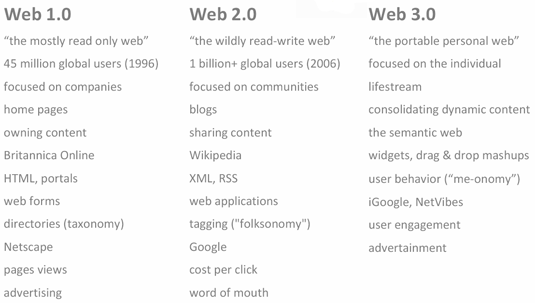Everything you wanted to know about social media and web 2.0
Social media is a phrase being tossed around a lot these days, but it can sometimes be difficult to answer the question of what is social media. If MySpace is a social media site, and Mag.nolia is a social media site, and Wikipedia is a social media site, then just what is social media?
Is it social networking?
Is it social bookmarking?
Is it wiki?
What is Social Media? The best way to define social media is to break it down. Media is an instrument on communication, like a newspaper or a radio, so social media would be a social instrument of communication.
In Web 2.0 terms, this would be a website that doesn't just give you information, but interacts with you while giving you that information. This interaction can be as simple as asking for your comments or letting you vote on an article, or it can be as complex as Flixster recommending movies to you based on the ratings of other people with similar interests.
Think of regular media as a one-way street where you can read a newspaper or listen to a report on television, but you have very limited ability to give your thoughts on the matter.
Social media, on the other hand, is a two-way street that gives you the ability to communicate too.
A Guide to the Social Web
Is Social Media and Social News The Same Thing? It is easy to confuse social media with social news because we often refer to members of the news as "the media." Adding to the confusion is the fact that a social news site is also a social media site because it falls into that broader category.
But social news is not the same thing as social media anymore than a banana is the same thing as fruit. A banana is a type of fruit, but fruit can also be grapes, strawberries, or lemons. And while social news is social media, social networking and wikis are also social media.
What Are Some Social Media Websites? Now that we have answered the question of what is social media, we can move on to social media websites. Because social media is such a broad term, it covers a large range of websites. But the one common link between these websites is that you are able to interact with the website and interact with other visitors.
Here are some examples of social media websites:
This video “Web 2.0″ was developed using the Web 2.0 write up in Wikipedia this video is to help teach educators about Web 2.0 tools:
Is it social networking?
Is it social bookmarking?
Is it wiki?
What is Social Media? The best way to define social media is to break it down. Media is an instrument on communication, like a newspaper or a radio, so social media would be a social instrument of communication.
In Web 2.0 terms, this would be a website that doesn't just give you information, but interacts with you while giving you that information. This interaction can be as simple as asking for your comments or letting you vote on an article, or it can be as complex as Flixster recommending movies to you based on the ratings of other people with similar interests.
Think of regular media as a one-way street where you can read a newspaper or listen to a report on television, but you have very limited ability to give your thoughts on the matter.
Social media, on the other hand, is a two-way street that gives you the ability to communicate too.
A Guide to the Social Web
Is Social Media and Social News The Same Thing? It is easy to confuse social media with social news because we often refer to members of the news as "the media." Adding to the confusion is the fact that a social news site is also a social media site because it falls into that broader category.
But social news is not the same thing as social media anymore than a banana is the same thing as fruit. A banana is a type of fruit, but fruit can also be grapes, strawberries, or lemons. And while social news is social media, social networking and wikis are also social media.
What Are Some Social Media Websites? Now that we have answered the question of what is social media, we can move on to social media websites. Because social media is such a broad term, it covers a large range of websites. But the one common link between these websites is that you are able to interact with the website and interact with other visitors.
Here are some examples of social media websites:
- Social Bookmarking. (Del.icio.us, Blinklist, Simpy) Interact by tagging websites and searching through websites bookmarked by other people.
- Social News. (Digg, Propeller, Reddit) Interact by voting for articles and commenting on them.
- Social Networking. (Facebook, Hi5, Last.FM) Interact by adding friends, commenting on profiles, joining groups and having discussions.
- Social Photo and Video Sharing. (YouTube, Flickr) Interact by sharing photos or videos and commenting on user submissions.
- Wikis. (Wikipedia, Wikia) Interact by adding articles and editing existing articles.
This video “Web 2.0″ was developed using the Web 2.0 write up in Wikipedia this video is to help teach educators about Web 2.0 tools:
This video “The Machine is Us/ing Us” is described as Web 2.0 in just under five minutes and was created by Dr. Michael Wesch, an Assistant Professor of Cultural Anthropology and Digital Ethnography at Kansas State University. It is really worth watching.
Read more Articles
|
|
|

